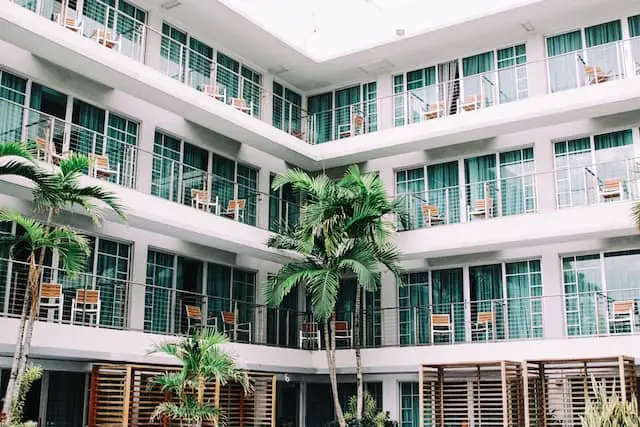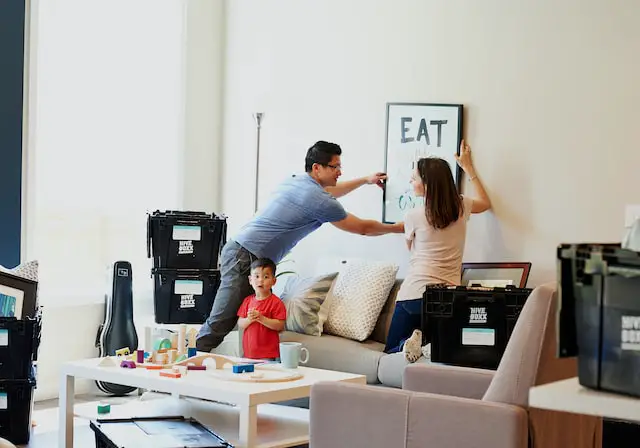Feeling ready to spread your wings and get a place of your own but don’t know where to start? Moving out for the first time is daunting and comes with a lot of challenges.
When moving out for the first time, you need to find a place that fits your budget, pack up and move there, and then make the space your own. Additionally, you have to navigate the stress of such a large change.
All of this creates a complex and often overwhelming situation. Let’s break everything down to help you know that you can totally handle this.
Importance of moving out
Moving out can be both exciting and daunting. It marks a major transition in your life – from living with your family to living on your own. Though it may seem intimidating at first, moving out is a crucial step toward gaining independence and responsibility.
It encourages you to become self-sufficient and manage your finances, cooking, cleaning, and other household tasks independently. It also provides an opportunity to embrace new experiences, make new friends, and expand one’s horizons. Moving out also helps you develop vital life skills such as time management, decision-making, and problem-solving due to your new independence.
All of this adds up to make moving out an essential part of your journey toward becoming a responsible, independent, and self-reliant adult.

Budgeting for Your First Move
I know, starting with budgeting is really boring and seems unrelated to where you actually end up. But it’s actually the foundation for everything else you’re going to do, so bear with me. It’s worth getting it right to make the rest of the process easier.
The first thing to remember is that money is a tool that you get to use as you best see fit. If you work from home, spending a little extra to get a nice place may be worth it. But if you prefer to spend your money on experiences or set it aside for savings or retirement, you can do that instead!
It’s hard when you’re first starting out to save, invest, go on vacations, and have a nice place to stay. You likely won’t have the income for that at the beginning, and that’s okay. You get to choose where your money goes, even if there’s not a lot of it yet to spend.
Renting vs. Owning
We’ll keep this article focused on renting, specifically on apartments as they’re plentiful and more standardized, but these principles can be applied to renting a house, too.
This focus on renting is in part because of how expensive houses are in many parts of the country and that you often need around 30% of the house price saved before purchasing the house. It’s also because the process of purchasing a house takes loads of mental energy, bringing a lot of stress.
The last thing you need when making a huge lifestyle shift that’s already stressful is to make it five times more complicated and anxiety-inducing. Once you’ve been on your own for a bit, you can revisit the decision to buy or rent.
Rent payments and utilities
Knowing what monthly recurring expenses you can afford is the most important consideration when moving. I write more about breaking down costs in this article but try not to spend a quarter of your take-home/net income on base rent. This may not be doable when starting out, and that’s okay. You now have a goal for the future to accomplish!
I made $32,000 per year when I got my own place, which was about $25,000 after taxes. My roommate plan fell through, so in order to afford it, I had to move to a rougher part of town, but I didn’t mind making that sacrifice to gain the extra independence. I got a place where the base rent was $629 per month, which was 30% of my take-home income. Not a bad start.
My utilities and parking were a flat fee, which brought my total after taxes to $766 per month (this didn’t include my $40 internet plan). 36% of your income coming out just to have shelter may seem like a waste of money, but the growth and responsibility (not to mention the independence) it gave me far outweighed the monetary cost.
It’s also worth noting that this was in Phoenix, AZ, a place known for having inflated housing prices, so you can likely make it work if you’re willing to, as well!
While you may need to spend a higher percentage of your income on housing when you’re starting out, try to keep it under 40%. Any more than that will likely cause you to feel like you can’t do anything fun and make money feel like a huge burden that you want to rebel against. That can lead to poor financial habits that will bite you later, so make a few sacrifices now to keep that from happening.
We’ll talk more about living with roommates later, but it’s worth noting that the price difference between a studio and a 2-bedroom apartment tends to be 20-30%. That means you could spend $1000 on a place by yourself or $650 with a roommate to split the costs.

Transportation Costs
Factoring in transportation costs is also vital as you build your budget.
If you take public transportation, then this is probably a negligible expense, and props to you for making that work.
Given that cars are the main form of transportation in the US, you’re more likely to have a car, which comes with a number of costs, including insurance, gas, and maintenance.
Living closer to places you frequent can help cut down on gas costs, but your car is likely costing you a few hundred dollars per month, not including any potential car payments you may be making.
Fortunately, you’re likely already in the habit of paying this expense, which makes it a lot easier to pay than the ones you’ll have to add due to moving.
Household Expenses (groceries, laundry, etc.)
Factoring in other fixed costs, like groceries and laundry is important.
Groceries will likely be your biggest new expense left and can vary widely depending on what groceries you buy. Start with a baseline budget of $300 and adjust it from there.
If you’re paying for other insurance due to not being on your parents’ plan, also factor those costs in.
Many apartments don’t have in-unit laundry facilities, so you’ll have to pay for laundry in those cases, which usually runs around $4 per load between washing and drying. If you do laundry 5 times per month, that $20 a month you have to consider. While not a lot, it’s worth making a note of and planning for.
I failed to account for small recurring expenses and found I had less left over to spend on fun things than I had anticipated. It’s better to overestimate costs than to underestimate them.
Moving Costs
Now that the recurring expenses are out of the way, you’ll need to save for moving expenses. Fortunately, you don’t need a lot of money if it’s a move across town, especially if you don’t have a lot of stuff.
When I first moved, I could fit everything in my car so that didn’t cost anything. The next time I moved, it took 2 car loads, so just the extra trip in gas ($5). The third time was across the country, so I rented a UBox; it’s no surprise that this was my most expensive move ($1200). My fourth move was the first with my wife from our 2-bedroom apartment to our house across town where we are now. That was just the cost of a small moving truck after gas and tax ($80).
As you can see, moving expenses can vary widely depending on your type of move, so budget accordingly. The nice thing is this is a one-time cost, so you don’t have to make space in your budget for it forever.

Living Alone vs. Living with Roommates
Living alone and living with roommates both have their own advantages and disadvantages. Ultimately, the decision to live alone or with roommates depends on your personal preferences and circumstances, and it requires careful consideration of the pros and cons of each option.
Pros and Cons of Living Alone
Living alone comes with both advantages and drawbacks. On the one hand, being able to enjoy your own space and decision-making is one of the most appealing aspects of living alone.
You have the freedom and flexibility to set your own schedule and entertain guests whenever you please. A small perk for me was getting to leave the toilet seat up all the time.
Additionally, living alone allows you to concentrate on yourself and pursue your own interests without worrying about the needs and preferences of others. You won’t have roommates asking you to go on spontaneous trips that you may not like.
However, the downside to living alone is the potential for loneliness and boredom. There is no one to share your day-to-day experiences with when you come home. Furthermore, multiple household tasks, such as cooking and cleaning, must be taken care of by you alone, and it’s up to you to pay all the bills at the end of the month.
When living alone, I got tired of trying to learn new recipes because of all the other chores and work I was doing, so I pretty much ate the same things, which got boring and bland after a while. Little things like that can add up if you’re not careful and dialed into how you feel and taking care of yourself.
Living alone also has some security risks, especially for women or the elderly, who may feel unsafe unless in a really nice community. Overall, living alone can be a great experience, but you need to be prepared to tackle the challenges that come with it.
Pros and Cons of Living with Roommates
Living with roommates also has its pros and cons.
On the positive side, roommates can split living expenses, reducing the cost of rent, utilities, and groceries. They can also provide companionship and a sense of security. Sharing household tasks can make daily chores more manageable, leaving more time for leisure activities.
However, living with roommates can also have negative aspects. Differences in personalities, schedules, and cleanliness can lead to arguments and stress. Sharing a living space requires compromise and communication, which can be difficult for some. Privacy can also be a concern, as personal space is limited when living with others.
Ultimately, whether living with roommates is a positive or negative experience depends on the individuals involved, their expectations, and their ability to communicate.

Finding a Place to Live
Finding a place to live is an exciting yet daunting task. If you want some good places to start, here’s an article to help you know what to expect from the apartment-hunting process, and here’s one covering how long you can anticipate finding an apartment to take.
Since you’ve already budgeted and figured out what you can afford, the hardest part is out of the way. Now, you just have to look for apartments until you find one that fits your needs.
There are several resources available to help you find a great apartment for you including online listings like apartments.com and property management companies like DTN Management.
Once you’ve found the place, the application process should be straightforward, if lengthy. If you have an inconsistent income or poor credit and are worried about how that will affect your chances of getting an apartment, this article should help.
Moving Tips
Moving to a new place can be both exciting and stressful, especially if it’s your first time. If you want to learn tips about moving without stress, here’s an article for you.
Remember to take care of yourself during the process by taking breaks, staying hydrated, and getting enough sleep. With a little bit of preparation and care, your first move can be a successful one.
Time management when moving out
Moving out is a big step in anyone’s life, and it becomes much easier with careful planning and good time management skills.
Start by making a list of all the things you need to do before you move, such as packing your belongings, arranging transport, changing your address, and disconnecting utilities.
Then, prioritize these tasks based on their urgency and complexity. Get them done when you have time between all of your other responsibilities. It pays to start early so that you don’t have to cram at the end. Just like with homework, you can procrastinate, but the consequences are a bit bigger if something goes wrong with moving than with homework.
Packing list when moving out
When you are planning to move out, create a packing list to stay organized. (Here’s a complete list of things to pack.)
The list should include furniture, clothes, bedding, toiletries, kitchen supplies, and cleaning supplies.
To save time when packing, label every box clearly with its room destination and whatever description you find most helpful so that when it comes to unpacking in your new home, you know exactly where everything is.
Whether or not to hire professional movers
While there are many times that hiring movers is a good idea, your first move is probably not one of them.
You likely don’t have very much extra money to pay movers or stuff that needs moving.
Plus, you learn a lot from moving everything yourself (or with friends and family). The experience will help you know what kinds of things you want to buy, knowing that you’ll eventually have to move them again and factoring that into your decision-making.

Setting Up Your Home After Your Move
Setting up your new home after a move can be a daunting task. You can find a great starting point on steps to take after moving in this article.
Start with the basics such as setting up your bed, unpacking your clothes and toiletries in your closet and bathroom, and stocking your kitchen with essential cooking utensils and groceries.
Once you have these areas sorted, move on to the living room and other common spaces. Don’t forget to tackle practical tasks such as changing the locks, setting up internet and utilities, and arranging any necessary repairs or maintenance. Remember that it’s okay to take your time with the process.
Furniture and Decor
Furniture and decor play an important role in making your new space feel like home.
Take your time living in the space, slowly figuring out small improvements you would like to add. Don’t go out and buy a bunch of stuff just to fill up spaces that feel empty.
Over time, you may find that you need to purchase new items to fit the space or that certain pieces no longer fit with your desired aesthetic.
Don’t be afraid to try new things and mix different styles. Additionally, adding personal touches such as artwork, photographs, and knick-knacks can help to make the space feel personalized and lived-in. Don’t underestimate the difference a few well-placed items hanging on a wall makes.
Since putting nails in the wall to hang things is a no-no, Command Hooks can become your best friend.
Keep in mind that pockets of “empty” floor space can bring a room to life and make it feel peaceful. This can be a challenge in small apartments or rooms, but it’s worth getting creative to cultivate such a feeling.

Dealing with Mental Health Challenges
The mental side of moving is important to consider, as it can drastically affect every part of the moving process.
Dealing with Loneliness
Moving can be a stressful and overwhelming experience, and feelings of loneliness often arise after settling into a new community. I wrote an article to dive deeper into dealing with loneliness while moving, but it’s still worth touching on briefly.
It can be difficult to adjust to new surroundings and meet new people, especially if you are not familiar with the area or have left behind close friends and family. However, there are several ways to combat this sense of loneliness.
One approach is to join local groups or clubs that cater to your interests, such as a sports team or book club. It can also be helpful to reach out to acquaintances or co-workers in the area and suggest meeting up for coffee or a meal.
If you need to build a new social life from scratch during the moving process, this article gives an in-depth look.
Remember that loneliness is a common experience and it may take time to adjust, so give yourself grace and be patient throughout the process.
Managing Stress and Anxiety Throughout the Moving Process
Moving to a new place can be a stressful experience, and often brings along with it feelings of anxiety. However, it’s important to manage this stress in order to maintain a healthy mental state.
Aside from the practical ways to manage each task as noted above, taking care of yourself through other practices can make everything smoother emotionally and mentally.
Some effective ways to do so include regularly exercising (could just be 10-20 minutes 3 times a week), meditating or doing breathing exercises, seeking out social support from friends or family, and engaging in activities that you find enjoyable or relaxing.
It’s also important to establish a routine in your new environment and to take the time to explore your new neighborhood to get acquainted with your surroundings. Lastly, seeking professional help from a therapist or counselor can be a beneficial option for those struggling with anxiety and stress at any time, including moving.
With all of the tips through this guide at your disposal, you can rock the moving process and thrive in your new home.

